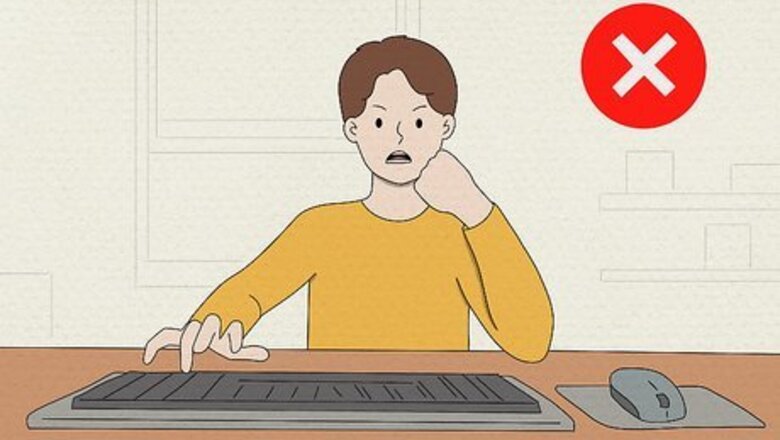
views
Reacting to a Bullying Incident
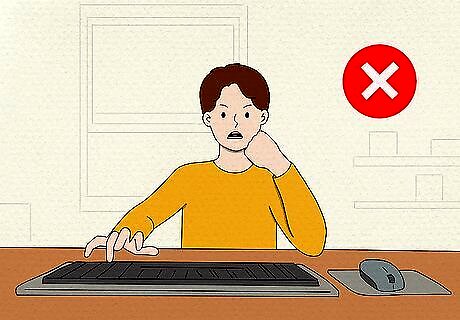
Resist the urge to respond directly. If you experience cyberbullying, the best response to the bully is no response at all. Replying to that hurtful comment will only worsen the problem, as it gives the bully exactly what they want — attention and an excuse to ramp up the bullying even more. Keep yourself cool. Remember that it's okay to be upset, but responding to the bully with an insult will only add more fuel to the fire. Even responding with non-insults — for instance, “Please stop,” “That’s not appropriate,” or “I’m going to report you,” — will probably do more harm than good. Respond only with silence.
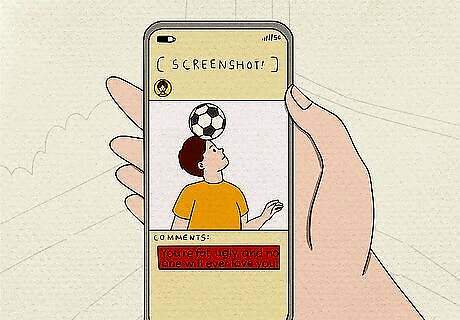
Save every bullying message, image, email, and post. Keep a record of anything that shows proof of cyberbullying. Save, or — even better — print out each and every mean thing they send. Bookmark or "favorite" the web pages they insult you on. The day may come when you'll need this evidence to report and stop them. You may just want to click "delete" on every hateful email, text, or IM. However, this is not the right way to go. Remember, there may come a time when this bully needs to be reported — and you'll need all the evidence right there in front of you.
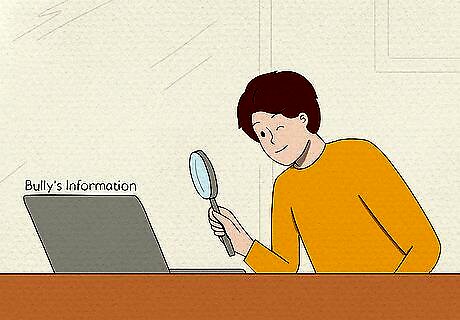
Gather identifying information for bullies you don’t recognize. Emails, screen names, and posted images can be deceiving, and can temporarily disguise a bully. If and when you do identify the attacker, keep this information as evidence only. Never try to confront the person directly. Keep a record of the email or screen name you've received the bullying from. Check your inbox for previous materials from this person. If there aren’t any, go to the service provider’s website, and search the screen name you have. If the profile is not blocked, you may be able to view this person's name. When all else fails, get others involved. Service providers, school officials, and especially law enforcement can track the IP address to help identify the attacker.
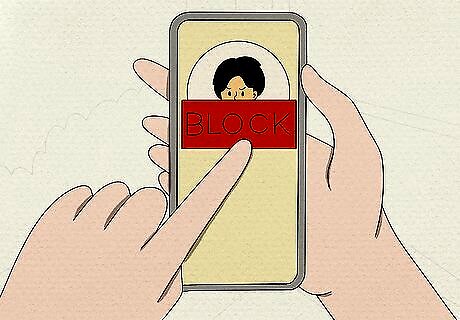
Block bullies and report them to service providers. Many major social media sites and other service providers include prominent “BLOCK” and/or “REPORT” buttons near any message or posting you receive. Familiarize yourself with the policies and procedures for each app, site, and device you use and don’t hesitate to use these tools. For instance, you can easily block users or report bullies and objectionable posts on Facebook. Check the "Settings" feature on other sites/apps to learn how to block or report bullying.

Tell a trusted adult. Cyberbullying is hurtful and wrong, and you don't have to accept it as something you “just have to live with.” Confide in a parent, teacher, coach, or other adult you trust. Present the evidence you’ve gathered, and don’t be ashamed to talk about how the bullying makes you feel. Adults can help take the next steps toward stopping the bully and can also support you as you deal with the experience. Even if the cyberbullying occurs beyond school property or school hours, report it to a teacher, counselor, resource officer, or principal. Schools have a responsibility to stop bullies and protect their targets no matter the circumstances.
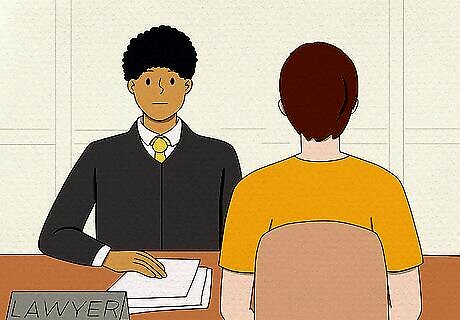
Report serious or ongoing bullying to legal authorities. Bullying of any kind, including cyberbullying, is now illegal in most jurisdictions. Let the adults you’ve confided in determine how to proceed — they might contact the bully's parents first or go straight to the authorities. If you've suffered substantial pain or humiliation from the bullying, or been threatened with harm or violence, the bully could be suspended, expelled, or even arrested. Any evidence of bullying that you’ve saved will be very helpful to the authorities. Keep in mind that if you’ve responded to bullying with bullying, it doesn’t matter if “they started it” — you may also be subject to discipline or even legal punishment.
Overcoming Negativity from Bullying

Remove the bullying from view. Save the messages or images as evidence, but don’t pore over them again and again. The old saying “out of sight, out of mind” can really help here. Do your best to clear the bullying from your sight and your mind. The bully wants you to obsess over the mean thing they wrote or unflattering image they posted. But you don’t have to play their game.
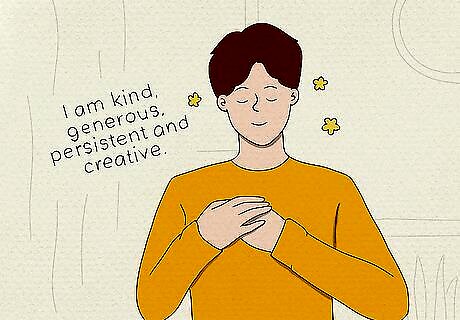
Dwell on your positive qualities instead. There’s no denying it — it hurts to have someone you know well (or even a stranger) write something like “You’re fat, ugly, and no one will ever love you.” But they don’t really know you — you know you. You know that you’re not perfect, but that you are kind, or generous, or persistent, or creative, or any number of other great qualities. So keep telling yourself that. Repeat your list of positive qualities to yourself whenever you start to feel down. You might even want to actually write the list down in the morning and at bedtime, to make it the first and last thing on your mind each day.

Make time for your true friends. Anyone who bullies you, or simply dislikes you, is not a real friend. Don’t waste your time with them. Instead, focus on friends who are supportive and who accept you for being you. Find a good listener, whether it’s a schoolmate, relative, etc. — someone who wants you to express how you feel. If you’re getting bullied because “you have no friends” or “nobody likes you,” don’t fall into the trap of believing the bully. Anyone can make friends — just be yourself, look for others with similar interests, give others a chance to know you, and be a good friend yourself.
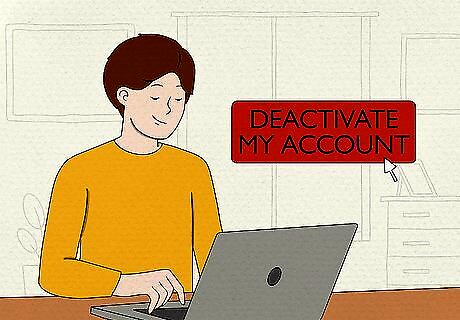
Take a break. If your daily digital routine gets you feeling down because of bullying, try changing things up. Remove your profiles from sites where the worst of the bullying occurred. Cut back on the time you spend online or the number of people you interact with. Consider taking a full-on cyber vacation to heal from the wounds of your bullying experience. You might be amazed by the amount of free time you’ll gain during this vacation. Use it wisely, on activities that make you feel better about yourself-as-you.

Do things you enjoy. Bullies try to steal your joy, usually because they're seeking attention or trying to deal with their own pain. But your happiness is in your hands. Don’t let the lies, cruel jokes, or harsh words of someone else stop you from doing the things that make you happy. Trying something new that’s based on something you already enjoy can provide both distraction and enhanced self-esteem. For instance, if you like being in the kitchen, sign up for a cooking class with a parent or friend. Or, if you love being around pets, volunteer at the local animal shelter.

Practice self-calming techniques. From time to time, the pain of being bullied will get the better of you. You’ll think about what was said or done and start to feel sad, angry, or confused, or maybe all three at once. Work on finding some self-calming techniques that are effective for you. In time, you may find that regular use of them makes you happier and healthier overall. Try activities such as deep breathing, progressive muscle relaxation, mindfulness techniques, meditation, prayer or spiritual practices, yoga, and exercise. You may get results from something as simple as taking a series of long, deep breaths (in for five seconds, slight pause, out for five seconds) while focusing on a word like “calm” or “happy.”
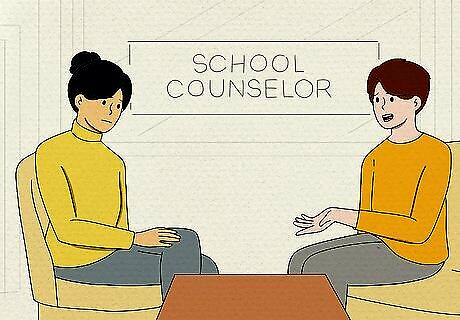
Seek professional support. Never feel like you’re weak or a failure if you simply can’t shake the pain caused by your cyber bully. Getting the help you need when you need it is a way to claim victory over a bully. Prove your strength by admitting to yourself and others when you need help. If being bullied is causing depression or ongoing low-self esteem, talk to a parent, school counselor, or physician about seeing a licensed therapist. If you start to have thoughts about self-harm, tell an adult you trust right away. You can also call or text a 24/7 hotline such as the Suicide and Crisis Lifeline (in the U.S.) at 988.
Reducing Cyberbullying
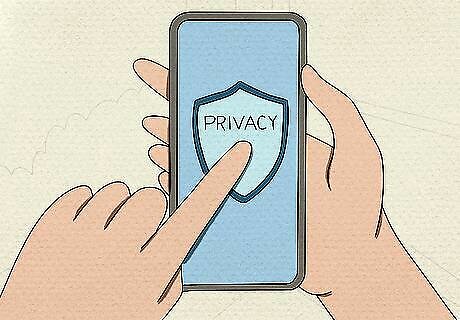
Keep your personal information private. Only give out your email, IM, blog, or any other screen name to people you absolutely, positively trust, and actually know in person. Never give out any of your passwords (for email, blog, chat, or social media accounts) to anyone, even the best friend you've known since kindergarten. Never share your phone number or home address over the Internet, either.
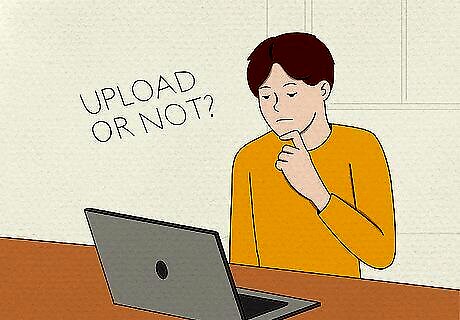
Post materials carefully and thoughtfully. Bullies can steal your secrets, twist your words, and doctor your images to use them against you. Before you hit “upload,” “send,” or “share,” stop and think about whether you want anyone, anywhere to potentially have access to this information for years to come. Posting about your current crush or sharing images of you partying with friends may seem like a good idea right now, but what about a year from now? Consider how might someone twist your words or images to use them against you, as well.
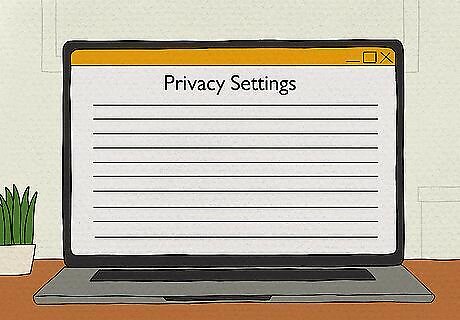
Understand and use privacy settings, filters, and blocks. For every site, app, and device you use take a bit of time to read through and understand the privacy settings. Learn how to restrict access to your information, and to report violations of your privacy and instances of bullying. As much as possible, restrict access to your digital life to only those people who you really trust.
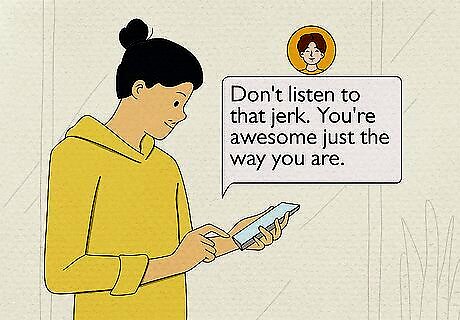
Don’t encourage others’ bullying. Forwarding, responding to, applauding, encouraging, supporting, or “liking” the bullying of someone else makes you equally to blame for causing pain to that person. It’s the same as laughing in someone’s face as they’re being bullied in person. Put yourself in the shoes of the person being bullied, and show the compassion to them that you would want to be shown to you. Even better than just not joining in or encouraging the bullying, do your part to put an end to it. Gather evidence and report the bully yourself. Send messages of support to the person, like “Don’t listen to that jerk. You’re awesome just the way you are.”
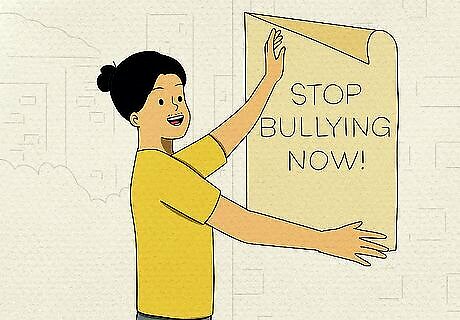
Support anti-bullying campaigns. Join or start a club at your school. Research and make posters or flyers. Lend your voice to the chorus of adults and kids out there who are saying that enough is enough and that bullying in all its forms must stop. Be a friend to someone who you know is being bullied, and encourage others to do the same. Show them that there are a lot more good people out there than there are bullies.










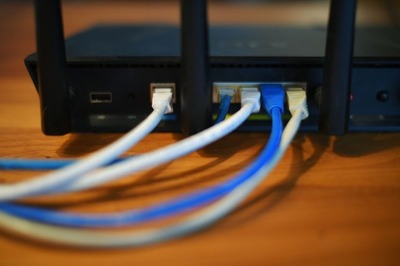






Comments
0 comment